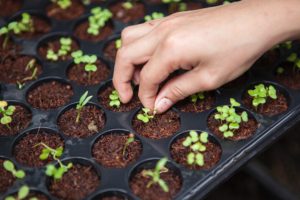Simple Steps to Living a Greener Life

Source: Photo by Joshua Lanzarini on Unsplash
By Laurie Larson
Going green and living a more sustainable life doesn’t have to be a nerve-racking experience. Anyone can make simple changes in their life to support eco-friendly practices without having to turn their whole lifestyle around.
Start off with these simple changes if you want to reduce your carbon footprint and be part of a positive global change to protect our planet.
- Recycle
Recycling is typically among one of the first things people think of when they consider being more eco-friendly. The large accumulation of waste is a pressing global issue that is bringing devastating effects to our planet.
When we recycle, we reduce carbon emissions, save energy, conserve natural resources, and keep our planet cleaner. If you don’t know where to start, follow this simple guide that shows you how to start recycling in your home.
- Use less water
An average family of four in the United States uses 400 gallons of water every day. That’s an insane amount of H2O!
Less than 1% of the water on our planet can be used by people, so we should be actively working to converse it. Cutting down on water use also helps cut down on energy, which in turn reduces pollution and conserves fuel resources. This is the type of positive chain of events our planet needs.
- Start a garden
Gardening can be a great way to connect more deeply with nature, practice a fulfilling hobby, and get a little exercise in. In even larger ways, gardens help protect the biodiversity of our planet by providing food for the bee population and other pollinating creatures.
The best part of gardening and growing your own food is the encouragement to be more conscious of your consumerism. By choosing to grow more of your own food, you buy in less to larger food supply chains who contribute to large productions of waste and carbon emissions due to transportation.
Once you have a garden growing, you can even start a compost bin to reduce the waste in your own home. Re-use items you would typically throw away like egg shells, coffee grounds, and nail clippings and you will both save money and help support your plants’ growth.
- Be more intentional about your purchases
When you’re making big purchases, you should think about looking for organic certifications to reduce your impact. One big item you should be intentional about is your mattress. While there are many factors you should consider when selecting your bed, an approval from names like Oeko-Tex or the USDA is one of the big you should look out for. These mattresses will be constructed with no pesticides and using chemical-free processes.
Some mattresses are constructed using non-biodegradable chemicals which can seep into our drinking water and harm aquatic life. The pesticides conventionally used in mattress production cause contaminate the soil and can destroy animal habitats. Be smart about any of your big purchases — your bed, furniture, car, or home — and think about the impacts it can have on the environment.
- Use and reuse
Think about how much you dispose of each day: food containers and packaging, plastic utensils, cups and straws, and that’s just the start. Find ways to reduce your waste by switching to reusable items.
Instead of taking plastic shopping bags from the store, bring in your own reusable bag. Don’t drink from plastic water bottles; refill a reusable bottle. Repurpose old clothes, towels, and laundry into cleaning rags or reusable dusters. Any way that you can reuse, repurpose, and refashion your items instead of adding to your waste pile is a great way to practice sustainability.
- Line dry your laundry
Throwing your clothes in the dryer after a wash is convenient, but it’s not energy-efficient. Save energy power by hanging your clothes on the line to dry. Just don’t wait to do your laundry on a rainy day.
- Stop the junk mail
One of the biggest factors we’ve been talking about is waste, and that’s because it’s a big problem in America. Eliminate even more waste in your life by stopping junk mail from coming to your house. Put an end to the credit card solicitations and endless promos that you never read anyways by getting your name pulled off mailing lists.
- Commute sustainably
Bicycling or walking are the best ways to be a sustainable commuter. Unfortunately this isn’t always practical and that sometimes leads people to reject smart commuting entirely. If bicycling or walking to your destinations isn’t an option for you, consider other ways to reduce your individual impact by carpooling or taking the bus. Going long distance? Take a train! There’s always a way to be a little more environmentally friendly.
- Switch out your light bulbs
This is a really simple change that can make a big impact. Instead of using incandescent light bulbs, switch to compact fluorescent light (CFL) bulbs. These last five times as long as incandescent bulbs and converse a lot more energy by using less than 70% of the energy that incandescent bulbs do. They also burn brighter, so you may be able to keep fewer lights on at a time.
- Keep on learning
Once you start making these changes towards greener living, make sure to keep investing your time in learning more about sustainable practices and ways you can help the world. Also make sure to build a community and spread the word around.
You may believe your own small changes won’t make much a difference. That’s why it’s necessary to encourage others to join along. By working together to live more eco-friendly lives, we can reduce our immediate impact on the planet and develop sustainable practices for future generations. We’re all in this together.
Author’s bio: Laurie Larson is a freelance writer from NC. She writes about healthy living and lifestyle topics.







Follow Us!